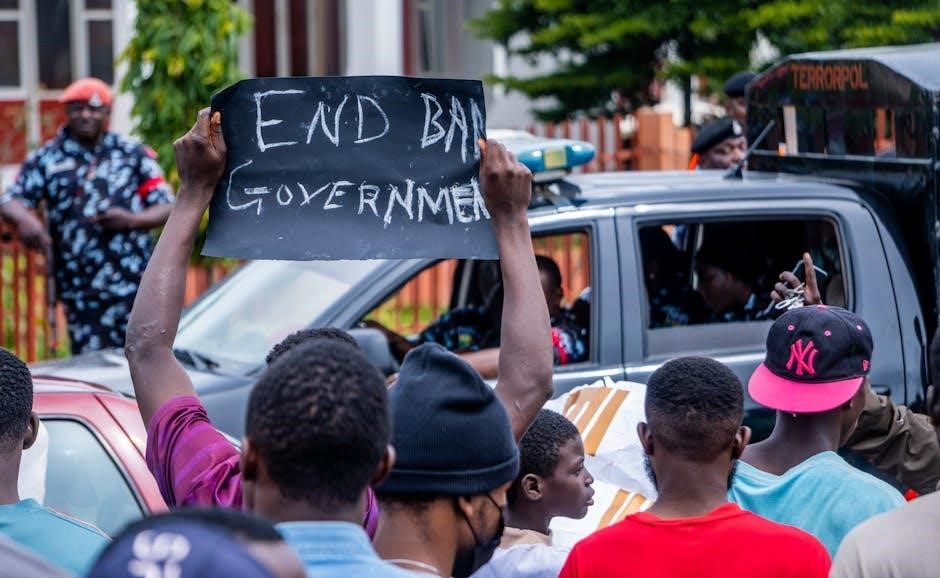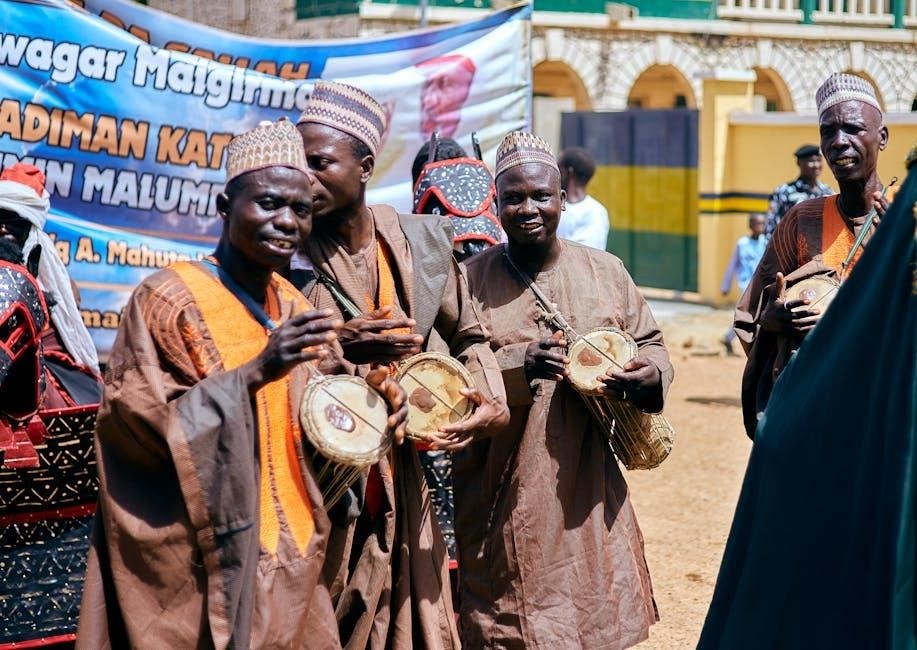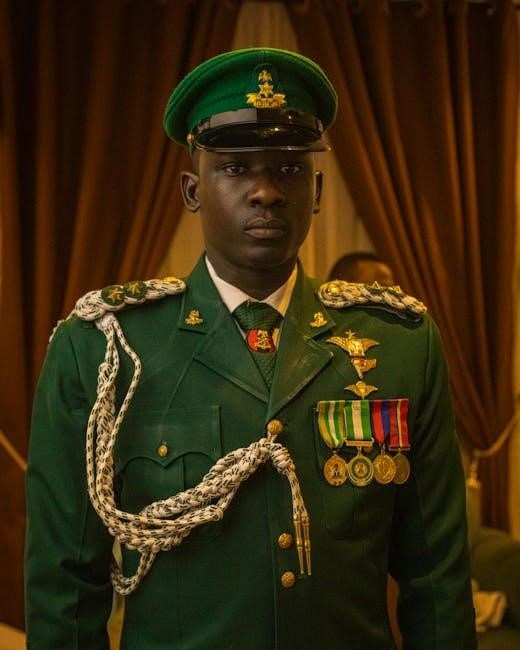military coups in nigeria pdf
Nigeria’s history has been marked by recurrent military coups, shaping its political landscape and governance. These interventions, often driven by instability and economic challenges, have significantly influenced the nation’s development and democratic processes.
Historical Context of Military Coups in Nigeria
Nigeria’s colonial past and post-independence political instability laid the groundwork for military interventions, beginning with the 1966 coup, which set a precedent for future power seizures.
2.1 Colonial Legacy and Its Impact
Nigeria’s colonial history under British rule established a framework of centralized governance, which inadvertently created a power vacuum post-independence. The colonial administration’s focus on resource extraction and neglect of local institutions led to weak political structures. Ethnic divisions, exacerbated by colonial policies, further fragmented the nation. The military, trained and organized by the British, emerged as a cohesive force in a fractured society. This colonial legacy fostered an environment where the military saw itself as a stabilizing force, justifying interventions to restore order amidst political chaos. These factors collectively set the stage for Nigeria’s first military coup in 1966.
2;2 Political Instability Post-Independence
Nigeria’s post-independence era was marked by deep political fragmentation and instability. The nation struggled with weak governance, ethnic tensions, and regional rivalries, which undermined civilian rule. Political parties, often aligned along ethnic lines, failed to foster unity or effective leadership. Corruption and mismanagement exacerbated public disillusionment, creating fertile ground for military intervention. The inability of civilian governments to address economic disparities and social inequalities further eroded their legitimacy. This chaotic political environment, coupled with a lack of institutional strength, set the stage for the first military coup in 1966, as the military sought to restore order and stability to a fractured nation.
Major Military Coups in Nigeria
Nigeria experienced a series of significant military coups between 1966 and 1985, each shaping its political trajectory and governance structure in profound ways historically.
3.1 The 1966 First Military Coup
Nigeria’s first military coup occurred on January 15, 1966, led by a group of young army officers. They overthrew the civilian government, citing corruption and political instability. The coup was violent, resulting in the assassination of key political leaders and military officers. Major Chukwuma Kaduna Nzeogwu was a prominent figure, targeting the federal government and regional leaders. This coup marked the beginning of military involvement in Nigerian politics, leading to a series of power struggles and counter-coups. The event had profound implications for Nigeria’s political stability and set the stage for further military interventions in subsequent years.
3.2 The 1966 Counter-Coup
The 1966 counter-coup, occurring on July 29, was a direct response to the first coup earlier that year. Northern military officers, dissatisfied with the perceived favoritism toward the Igbo in the initial coup, launched this intervention. General Aguiyi Ironsi, the head of state, was assassinated during the counter-coup. Colonel Yakubu Gowon emerged as the new leader, marking the beginning of his long tenure. This event deepened ethnic tensions and contributed to the outbreak of the Biafra Civil War in 1967. The counter-coup highlighted the fragility of Nigeria’s political structure and set the stage for prolonged instability and future military interventions.
3.3 The 1975 Military Coup
The 1975 military coup in Nigeria was a bloodless takeover that ousted General Yakubu Gowon’s government on July 29. Led by General Murtala Mohammed and a group of senior officers, the coup was motivated by growing dissatisfaction with Gowon’s leadership and the perception of his government as corrupt and ineffective. The coup marked a significant shift in Nigeria’s political landscape, with Mohammed promising reforms and a return to civilian rule. His tenure, though short-lived due to his assassination in 1976, introduced policies aimed at addressing corruption and improving governance, leaving a lasting impact on Nigeria’s military and political structures.
3.4 The 1983 Military Coup
The 1983 military coup in Nigeria occurred on December 31, led by a group of senior army officers who overthrew the democratically elected government of President Shehu Shagari. This coup marked the end of Nigeria’s Second Republic and was driven by widespread dissatisfaction with corruption, economic mismanagement, and political instability. The military, under the leadership of General Muhammadu Buhari, seized power, promising to restore order and address the nation’s crises. The coup was met with mixed reactions, as some Nigerians hoped for reform while others feared a return to authoritarian rule. It set the stage for another coup in 1985, further destabilizing the country’s political landscape.
3.5 The 1985 Military Coup
The 1985 military coup in Nigeria occurred on August 27, when General Ibrahim Babangida overthrew the government of General Muhammadu Buhari. This coup was justified by the military as a response to Buhari’s authoritarian rule and the country’s worsening economic conditions. Babangida promised reforms and a transition to civilian rule, but his regime was marked by continued human rights abuses and corruption. The coup further entrenched military influence in Nigerian politics and prolonged the nation’s democratic struggles. It highlighted the cyclical nature of military interventions, driven by internal power struggles and dissatisfaction with governance. This period deepened public skepticism of military leadership.
Causes of Military Coups in Nigeria
Nigeria’s military coups stem from political instability, economic inequality, ethnic tensions, and corruption. Weak governance and external influences further exacerbate these factors, creating fertile ground for interventions.
4.1 Political Instability and Weak Governance
Political instability and weak governance have long been central drivers of military coups in Nigeria. The post-independence era saw factionalism, ineffective leadership, and a breakdown in democratic processes. Ethnic rivalries and regional tensions further destabilized the political system. The first coup in 1966 occurred amid widespread dissatisfaction with the government’s inability to address corruption and ensure equitable representation. Subsequent coups, such as those in 1975, 1983, and 1985, were often justified by the military as interventions to restore order and combat mismanagement. This cycle of instability created a power vacuum, reinforcing the military’s role in politics and undermining civilian rule.
4.2 Economic Factors and Inequality
Economic challenges and social inequality have consistently contributed to military coups in Nigeria. Widespread poverty, unemployment, and unequal resource distribution fueled public discontent. The 1983 coup, for instance, followed economic mismanagement and austerity measures that exacerbated hardship. Ethnic and regional disparities further intensified tensions, as certain groups perceived neglect or marginalization. Economic instability created an environment where the military could justify interventions as necessary to address systemic failures. These factors, compounded by corruption, eroded trust in civilian governance and provided a rationale for military takeovers, perpetuating a cycle of political instability and undermining long-term economic development;
4.3 Ethnic and Regional Tensions
Ethnic and regional tensions have played a significant role in Nigeria’s military coups. The country’s diverse population, divided along ethnic lines, often led to political polarization. Regional competition for resources and power created mistrust among groups, with some feeling marginalized. Historical grievances, such as the dominance of certain ethnic groups in governance, fueled resentment. These tensions escalated into violence during the civil war and persisted post-independence. The 1966 coups, for instance, were heavily influenced by ethnic rivalries, while later coups, such as those in 1983 and 1985, further highlighted regional disparities. Such divisions weakened national unity and provided a rationale for military interventions.
4.4 Corruption and Mismanagement
Corruption and mismanagement have been central to Nigeria’s military coups. Civilian governments were often accused of embezzlement, nepotism, and failing to address economic disparities. The 1983 coup, led by General Muhammadu Buhari, cited corruption as a primary justification. Military leaders portrayed themselves as saviors, promising to restore order and accountability. However, many coups resulted in regimes that were equally or more corrupt. The mismanagement of public funds and resources exacerbated public discontent, creating an environment where military interventions were seen as necessary solutions. This cycle of corruption and intervention has hindered Nigeria’s political stability and economic development, perpetuating a vicious cycle of instability.
4.5 External Influences and Interventions
External influences have played a significant role in Nigeria’s military coups, often exacerbating internal tensions. Neighboring countries’ political instability, such as coups in Niger and Gabon, has heightened fears of regional contagion. International interventions, including Cold War-era foreign backing of factions, further complicated Nigeria’s political landscape. The international community’s responses, such as sanctions or diplomatic pressure, have sometimes inadvertently destabilized governance. Regional organizations like ECOWAS have attempted to mediate, but their efforts have had mixed success. These external factors, coupled with Nigeria’s strategic importance, have made it a focal point for global geopolitical interests, influencing its susceptibility to military interventions and power struggles.

Consequences of Military Coups
Military coups in Nigeria have led to political instability, economic downturns, and societal mistrust. Public sentiment shifted over time, with growing skepticism toward military interventions as solutions to governance issues.
5.1 Political Consequences and Power Shifts
Military coups in Nigeria have led to significant political consequences, including frequent power shifts and the destabilization of governance structures. The overthrow of governments often resulted in the rise of new military leaders, creating cycles of instability. Democratic institutions were weakened, and civilian rule was repeatedly disrupted. These coups perpetuated a pattern of authoritarian governance, undermining the country’s political development. The constant changes in leadership hindered long-term policy implementation and fostered an environment of uncertainty. The political landscape became increasingly fragmented, with power concentrated in the hands of the military, further entrenching its role in Nigerian politics and delaying the consolidation of democracy.
5.2 Economic Impact and Instability
Military coups in Nigeria have caused significant economic instability, disrupting growth and development. The frequent overthrow of governments led to policy inconsistencies, discouraging foreign investment and creating an unpredictable business environment. Resources were often mismanaged under military regimes, exacerbating corruption and inequality. Infrastructure projects stalled, and public services deteriorated, worsening living conditions. The coups also disrupted trade relations and led to international sanctions, further straining the economy. Economic instability deepened poverty and unemployment, fostering social unrest. The repeated cycles of political turmoil hindered Nigeria’s ability to achieve sustainable economic development, leaving long-lasting scars on its financial landscape and hindering progress for generations.
5.3 Social Consequences and Public Sentiment
Military coups in Nigeria have had profound social consequences, fostering widespread fear, mistrust, and division. Public sentiment often shifted from initial support to disillusionment as promises of reform failed; The frequent disruptions led to a breakdown of social cohesion, with ethnic and regional tensions escalating. Civil liberties were curtailed, and human rights abuses became common, eroding public confidence in governance. The repeated cycles of military rule created a culture of uncertainty, discouraging long-term societal planning. Over time, public sentiment toward coups became increasingly negative, as Nigerians realized the devastating impact on stability and development. This disillusionment fueled demands for enduring democratic governance and accountability.
5.4 Long-term Effects on Governance
Military coups have left an indelible mark on Nigeria’s governance structures, undermining institutional stability and accountability. The frequent overthrow of governments disrupted policy continuity, leading to fragmented development plans and weak governance frameworks. The reliance on military rule stifled the growth of democratic institutions, fostering a culture of authoritarianism. Over time, this eroded public trust in government and hindered the development of robust legal and administrative systems. The cyclical nature of coups also perpetuated a cycle of short-term decision-making, prioritizing regime survival over long-term national development. These effects have lingering impacts, challenging Nigeria’s efforts to establish enduring democratic governance and effective public administration.

Impact on Nigerian Democracy
Military coups have severely weakened Nigeria’s democratic framework, fostering a cycle of instability and undermining public trust in civilian governance and democratic institutions.
6.1 Erosion of Democratic Institutions
Military coups have significantly eroded Nigeria’s democratic institutions, undermining the legitimacy and effectiveness of its political systems. The repeated interventions by the military disrupted the establishment of strong, independent institutions essential for democracy. Key structures such as the judiciary, legislature, and electoral bodies were often manipulated or weakened during periods of military rule. This undermining of checks and balances has led to a lack of accountability and a diminished capacity for these institutions to function effectively, even after transitions to civilian governance. The result has been a persistent struggle to consolidate democratic governance and ensure the rule of law in Nigeria.
6.2 Challenges to Civilian Rule
Military coups have posed significant challenges to civilian rule in Nigeria, often stemming from political instability and weak governance. The 1966 coups, for instance, highlighted deep ethnic and regional divisions that undermined civilian authority. Economic mismanagement and corruption further eroded public trust in democratic leadership, creating fertile ground for military intervention. Additionally, the legacy of authoritarian rule has made it difficult for civilian governments to establish strong, accountable institutions. These challenges have persisted, with periodic calls for military intervention resurfacing during times of economic hardship or political crisis, threatening the stability of civilian rule and Nigeria’s democratic progress.

Role of the Military in Nigerian Politics
The Nigerian military has historically played a dominant role in shaping the nation’s political landscape, often intervening during periods of instability to assume governance and restore order.
7.1 Historical Role and Influence
The Nigerian military’s historical role in politics is profound, with its involvement dating back to the first coup in 1966, which led to a series of interventions. The military’s influence grew as it repeatedly seized power during periods of instability, reshaping governance and policies. This pattern continued through key coups in 1975, 1983, and 1985, cementing the military’s role as a pivotal force in Nigerian politics. Their interventions were often justified as necessary to restore order, yet they frequently resulted in authoritarian rule, impacting the nation’s democratic evolution and institutional development.
7.2 Current Perspectives and Reforms
Today, Nigeria faces a shifting landscape regarding military involvement in politics. Despite its history of coups, the nation has embraced civilian rule, with recent discussions emphasizing the risks of military intervention. Calls for coups, driven by economic hardship, have been met with opposition from leaders like Femi Fani-Kayode, who argue against such measures. The Defence Headquarters has also dismissed rumors of military takeovers, signaling a commitment to democracy. Reforms focus on strengthening institutions and promoting professionalism within the military to prevent future interventions. These efforts aim to ensure the armed forces remain guardians of democracy, not its disruptors, fostering long-term stability and governance.
Preventing Future Military Coups
Preventing future coups requires strengthening democratic institutions, addressing socioeconomic disparities, and enhancing military professionalism. Regional stability efforts and public trust in governance are also critical.
8.1 Strengthening Democratic Institutions
Strengthening democratic institutions is crucial to prevent military coups in Nigeria. This involves ensuring free and fair elections, an independent judiciary, and robust legislative oversight. Enhancing transparency and accountability within government agencies can build public trust and reduce corruption. Civil society organizations must also be empowered to monitor governance and advocate for reforms. By fostering a culture of democracy and rule of law, Nigeria can create an environment where military intervention becomes unnecessary and unacceptable. Institutional reforms should focus on long-term stability, ensuring that power transitions remain peaceful and constitutional.
8.2 Addressing Socioeconomic Disparities
Addressing socioeconomic disparities is essential to prevent military coups in Nigeria. Economic inequality and widespread poverty have historically fueled discontent, creating fertile ground for military interventions. Implementing policies that promote economic growth, reduce unemployment, and ensure equitable resource distribution can mitigate these tensions. Investing in education, healthcare, and infrastructure in underserved regions is critical. By addressing these disparities, Nigeria can reduce social unrest and create a more stable environment, diminishing the likelihood of military coups. Bridging the gap between the rich and poor ensures a more cohesive society, fostering long-term peace and stability.
8.3 Enhancing Military Professionalism
Enhancing military professionalism is crucial to preventing future coups in Nigeria. This involves fostering a culture of discipline, accountability, and adherence to democratic values within the armed forces. Professional training and education that emphasize civilian oversight and the rule of law are essential. Ensuring transparent promotions and merit-based advancements can reduce internal tensions and political ambitions. Strengthening institutional frameworks to prevent corruption and abuse of power is also vital. A professional military, focused on national security rather than politics, is better equipped to support democracy. These reforms can help the military stay apolitical, safeguarding Nigeria’s democratic future and reducing coup risks.

Regional and International Implications
Military coups in Nigeria impact West African stability, influencing neighboring countries and regional blocs. International communities often impose sanctions, affecting Nigeria’s economy and global diplomatic relations significantly.
9.1 Impact on West African Stability
Military coups in Nigeria have far-reaching consequences for West African stability, often creating ripple effects in neighboring countries. The region’s political landscape becomes vulnerable to similar interventions, as seen in recent coups in Niger and Gabon. Economic instability in Nigeria, a regional powerhouse, can weaken trade relations and hinder regional integration efforts. Additionally, security challenges stemming from Nigeria, such as insurgency and banditry, can spill over into neighboring states, exacerbating regional insecurity. The Economic Community of West African States (ECOWAS) often faces heightened challenges in maintaining stability, as political upheavals in Nigeria can undermine collective efforts to foster peace and development across the subregion.
9.2 International Community’s Role
The international community plays a crucial role in addressing military coups in Nigeria, often through diplomatic and economic measures. Organizations like the United Nations and the African Union condemn such actions, advocating for the restoration of democratic governance. Economic sanctions are frequently imposed to pressure coup leaders, while foreign aid is withheld to emphasize the need for civilian rule. Additionally, international actors provide support for democratic institutions to prevent future coups. However, the effectiveness of these interventions often hinges on the collective will of the global community and the willingness of Nigerian stakeholders to embrace reform and uphold democratic principles to ensure long-term stability and development.
Nigeria’s history of military coups reflects a complex interplay of political instability, economic challenges, and social tensions. Addressing these issues is crucial for fostering enduring democracy and stability in the nation.
10.1 Summary of Key Points
Nigeria’s history of military coups has profoundly shaped its political landscape, with the first occurring in 1966 and followed by several others in 1966, 1975, 1983, and 1985. These interventions were driven by political instability, economic inequality, ethnic tensions, corruption, and external influences. The coups often led to power shifts, economic instability, and social unrest, undermining democratic institutions and civilian rule. Addressing these underlying issues is crucial for preventing future coups and ensuring long-term stability. Strengthening governance, promoting economic equality, and fostering military professionalism are essential steps toward a sustainable democratic future for Nigeria.
10.2 Future Prospects for Nigeria
Nigeria’s future hinges on addressing the root causes of military coups, including political instability, economic disparities, and corruption. Strengthening democratic institutions, promoting transparency, and ensuring accountability are critical. Economic reforms to reduce inequality and improve living standards can mitigate unrest. Enhancing military professionalism and adherence to civilian rule is essential. Regional stability efforts, such as those in West Africa, can further deter coups. International partnerships and support for governance reforms also play a vital role. By fostering a culture of democracy and inclusivity, Nigeria can move beyond its tumultuous past and build a stable, prosperous future for its citizens.

